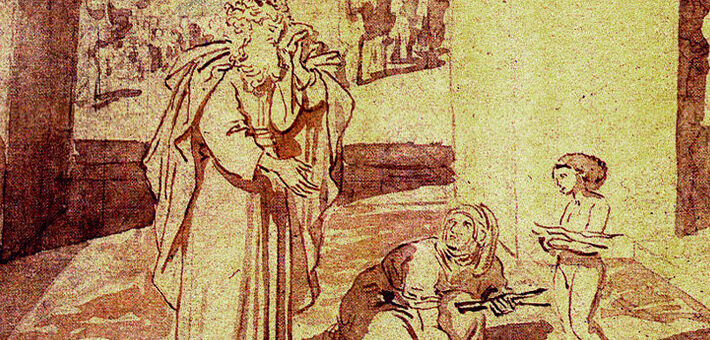Commentary on 1 Kings 17:17-24
How do we know that Elijah is really a “man of God”?
The widow of Zarephath is unsure of Elijah’s identity when, after taking the prophet into her home, her son becomes deathly sick. By the end of the story, though, she is ready to proclaim, “Now I know that you are a man of God, and that the word of the LORD in your mouth is truth” (1 Kings 17:24). What enables such a dramatic shift in her outlook?
Nothing less than the resuscitation of her dead child changes her mind. Elijah’s revival of her child from death to life relieves her doubt about who Elijah is, what his purposes are, and from whom his strange powers originate. Of course she now believes he speaks God’s truth! Witnessing such a miracle would make a believer out of any of us — at least, we hope it would. But the widow’s profession of faith is not the only movement from doubt to belief in this story.
Elijah himself is anguished by the child’s sickness. His prayer accuses God of having wrought evil in the house that has given him refuge from God’s own drought and famine (17:1). Already in this brief chapter, we learn that he has antagonized the king (17:1), received food from birds (17:2-7), and sought sustenance from a starving widow (17:8-16), all because the word of the LORD has come to him. Obedience, both his and the widow’s, seems to have been rewarded with suffering.
Elijah does not voice this doubt publicly. In all of his interactions with the widow, he adopts a matter-of-fact tone. He does not answer the widow’s invective, in which she accuses him of singling her out and making her answer for her sins (17:18). He only says, “Give me your son,” and he carries the boy upstairs. When the boy is breathing again, he brings him back down to his mother, saying, “See, your son is alive” (17:23). Only upstairs, alone with the lifeless boy in his room, does Elijah’s sorrow spill out.
As a “man of God” (’ish ha-’elohim), Elijah both delivers God’s messages and performs wondrous acts of power.1 He stands against the monarchic status quo, exemplified by the reign of Ahab and his queen Jezebel, who participate in Baal-worship, hoard the kingdom’s resources, and relentlessly pursue their opponents. Elijah will spend much of the rest of his time on earth either running from royalty or confronting it. It will be an exhausting vocation. In this week’s appointed story, though, Elijah already seems spent, frustrated, and full of doubt. Like the widow herself, Elijah grieves. When the child is revived, God turns the mourning of both — leader and follower, prophet and widow — into joy.
In the story immediately preceding this one, which is offered as another possible lectionary reading this week, Elijah’s arrival at the widow’s house has meant the arrival of abundance in a time of want (17:8-16). When the widow makes cakes out of the final bits of meal and oil in her house, the meal and oil last for days and days. For a Christian reader, that story echoes in the multiple “loaves and fishes” accounts in the Gospels.
In the same way, Elijah’s revival of the widow’s son echoes in this week’s appointed Gospel reading, Luke 7:11-17, in which Jesus revives another widow’s son. The widow of Zarephath’s doubt, however, recalls a third Gospel narrative. At Mark 9:14-32 Jesus heals a boy with an unclean spirit. The boy’s father couches his request in terms of doubt: “…if you are able to do anything, have pity on us and help us” (Mark 9:22). Jesus responds that all is possible for a believer, to which the boy’s father famously replies, “I believe; help my unbelief!” (Mark 9:24)
The widow of Zarephath displays this same duality of belief and unbelief, surety and doubt. After all, the widow already should have known that Elijah can work miracles, since he has sent away emptiness and hunger from her house. When the widow admonishes Elijah after her son becomes ill, she even calls him a “man of God.” (1 Kings 17:18). She can easily believe in Elijah’s power as something that brings death. Anybody can kill; there’s nothing difficult about that. The widow knows a lot about death, having been ready to enter its embrace when she and her son were at the brink of starvation.
Elijah’s real power, the LORD’s truth in his mouth, is that he can bring about life. This is the truth that is more difficult to believe, the one that flies in the face of all we know about the world, where death always seems to have the last word. Elijah’s miraculous, never-ending oil jar hints at such life-giving power, but it is the widow’s witnessing of her child’s renewed life that convinces her.
The widow’s doubt, as well as her profession of faith, may also be our own. It is easy to believe in death-dealing powers, for that is what we witness in the world every day. It is much harder to imagine the power of love that conquers death. Read anew in light of the death and resurrection of Jesus Christ, the story of Elijah and the widow of Zarephath adds to that “great cloud of witnesses” who affirm God’s ultimate sovereignty over even death itself.
1For more on “man of God” and its relationship to other prophetic titles, see D. L. Petersen, The Prophetic Literature: An Introduction (Louisville: Westminster John Knox, 2002), 5-8.


June 9, 2013